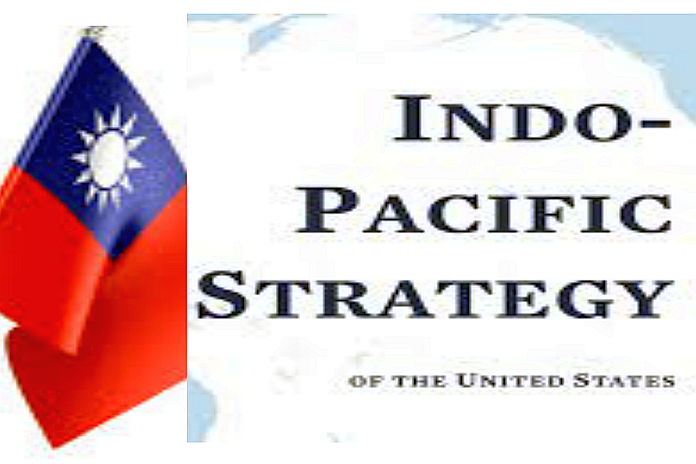By Caribbean News Global ![]()
TORONTO, Canada – The US cannot send mixed signals to Taiwan and the global economy relative to trade, health, security, democracy engagement, innovation, digital transformation, etc,. and thus, the Indo-Pacific Economic Framework (IPEF) with like-minded willing partners must engage Taiwan in an ambiguous global economic framework.
Taiwan is a key strategic and trading partner intertwined with US economic security and global positioning. And the inclusion of Taiwan in IPEF co-defines a clear signal that the United States stands with Taiwan, allies and partners.
Taiwan’s democracy was recently ranked as the eighth-most-vibrant democracy in the world, according to the Economist Intelligence Unit’s latest Democracy Index. And Taiwan’s “free” global economic advancement speaks volumes, as referenced by continuous economic growth – America’s ninth-largest overall trading partner, accounting for more than 90 percent of the world’s semiconductor outputs.
Taiwan has demonstrated that it is a trusted partner to the world and a stabilizing force to free enterprise, entrepreneurship, prosperity, and security. And that’s precisely why Taiwan matters more than ever with the tremendous value of forward-looking like-minded and willing partners/alliances.
Including Taiwan in the Indo-Pacific Economic Framework is a forward-thinking next step – a win-win; in the context of China’s unfounded claims, and more recently, Russia’s ongoing invasion of Ukraine.
In both scenarios, Taiwan is strategically vital to global repositioning, an Indo-Pacific economic power and leadership.
Taiwan’s continual global expansion as an essential partner is timely and most acute in the Indo-Pacific. Including Taiwan within the IPEF, is an opportunity that cannot be squandered.
The Biden administration ( Asia tour) announced the widening of the IPEF which also includes India and Vietnam, reaffirming US engagement in the region. Fiji will become the 14th country and the first Pacific island nation (attracting developing countries) to join the economic framework.
On May 23, in Tokyo, Japan, president Biden launched the Indo-Pacific Economic Framework for Prosperity (IPEF) with a dozen initial partners: Australia, Brunei, India, Indonesia, Japan, Republic of Korea, Malaysia, New Zealand, the Philippines, Singapore, Thailand, and Vietnam. Together, we represent 40 percent of world GDP, the White House statement noted.
“The United States and our partners in the region believe that much of our success in the coming decades will depend on how well governments harness innovation – especially the transformations afoot in the clean energy, digital, and technology sectors – while fortifying our economies against a range of threats, from fragile supply chains to corruption to tax havens. […] The framework will focus on four key pillars to establish high-standard commitments that will deepen our economic engagement in the region.”~ Whitehouse briefing statement.
The IPEF aims to foster common standards across four broad areas: trade; supply chains; clean energy, decarbonisation and infrastructure; and tax and anti-corruption.
Connected Economy: On trade, we will engage comprehensively with our partners on a wide range of issues.
Resilient Economy: We will seek first-of-their-kind supply chain commitments that better anticipate and prevent disruptions in supply chains to create a more resilient economy and guard against price spikes that increase costs for American families.
Clean Economy: We will seek first-of-their-kind commitments on clean energy, decarbonization, and infrastructure that promote good-paying jobs.
Fair Economy: We will seek commitments to enact and enforce effective tax, anti-money laundering, and anti-bribery regimes that are in line with our existing multilateral obligations to promote a fair economy.
On the record press call, for the launch of the IPEF, US National Security Advisor Jake Sullivan stated:
“We intend to pursue a deeper bilateral engagement with Taiwan on trade and economic matters in the coming days and weeks. And we think that that track can help strengthen both of our economies while we’re also pursuing IPEF with the countries that we listed. And we think it puts us in the best position for us to be able to enhance our economic partnership with Taiwan and also to carry IPEF forward with this diverse range of countries.”
US Trade Representative Katherine Tai termed IPEF an opportunity to “tackle 21st-century challenges and promote fair and resilient trade for years to come.”
On the question of Taiwan’s participation in IPEF, US Trade Representative Tai, explained:
“Let me just very, very quickly – on the Taiwan question, I did just meet minister John Deng in Bangkok. And we had a great conversation. It was a really, really encouraging and really dynamic meeting that we had. And coming out of the conversation we had – I think this was just two days ago – both minister Deng and I have committed that our teams would be in touch and that we’d be in touch in the next couple of weeks. So please stay tuned for that.”





